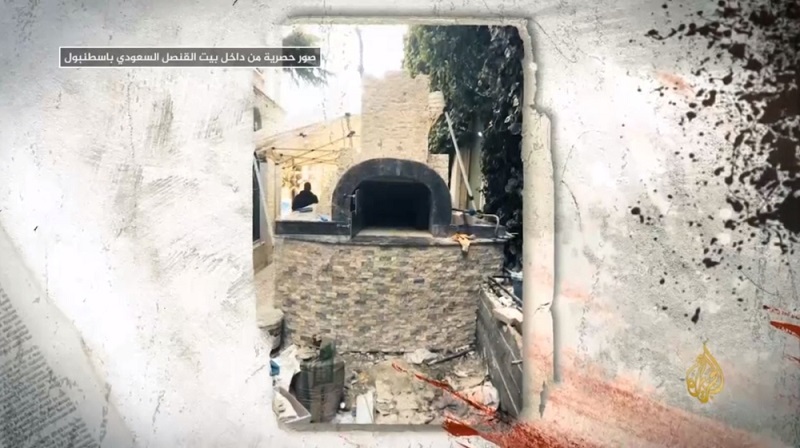
People protest against the killing of journalist Jamal Khashoggi in Turkey outside the Saudi Arabian Embassy in London, Britain, October 26 2018. REUTERS/Simon Dawson
New documentary says Turkish investigators also found traces of Khashoggi's blood on walls of the Saudi consul's office.
The body of slain Saudi journalist Jamal Khashoggi was likely burned in a large oven at the Saudi consulate general's residence in Istanbul, an Al Jazeera investigation revealed.
New details of the writer's murder by a Saudi assassination team were reported in a documentary by Al Jazeera Arabic that aired on Sunday night.
Turkish authorities monitored the burning of the outdoor furnace as bags believed to be carrying Khashoggi's body parts were transferred to the Saudi consul's house after he was killed inside the consulate a few hundred metres away.
Al Jazeera interviewed a worker who constructed the furnace who stated it was built according to specifications from the Saudi consul. It had to be deep and withstand temperatures above 1,000 degrees Celsius - hot enough to melt metal.
Bags of meat were also cooked in the oven after the killing in order to cover up the cremation of the Saudi writer's body, authorities reported.
The burning of Khashoggi's body took place over a period of three days, Turkish officials said.

The furnace in the garden of the Saudi consulate general's residence in Istanbul [Al Jazeera]
Turkish investigators also found traces of Khashoggi's blood on the walls of the Saudi consul's office after removing paint that the assassination team applied after killing the Washington Post columnist on October 2, 2018.
The documentary was based on interviews with security officials, politicians, and some of Khashoggi's Turkish friends.
First contact
Turkish intelligence chief Hakan Fidan was the first official to contact the Saudis according to the documentary.
In a call with the defacto Saudi leader, Fidan reportedly demanded that Crown Prince Mohammed bin Salman (also known by his initials MBS) reveal the whereabouts of Khashoggi.
The call was cut short though when MBS rejected the demand and ended the call over an "unacceptable threat".
'Rogue elements'
A critic of Saudi Arabia's powerful Mohammed bin Salman (MBS), Khashoggi entered the consulate in Istanbul to obtain paperwork so he could marry his Turkish fiancee, Hatice Cengiz.
Riyadh initially insisted Khashoggi had left the consulate alive before changing its account and admitting the journalist was killed in an operation it said was undertaken by "rogue elements".
A CIA report said MBS likely ordered Khashoggi's killing - an allegation Saudi Arabia denies.
Eleven suspects have been indicted for Khashoggi's murder in Saudi Arabia, which has insisted it would handle the case and refused their extradition to Turkey.
United Nation's special rapporteur Agnes Callamard, who is leading an international inquiry into the murder, called it "a brutal and premeditated killing, planned and perpetrated by officials of the state of Saudi Arabia".
The international investigation started in late January and an official report is due in June.




